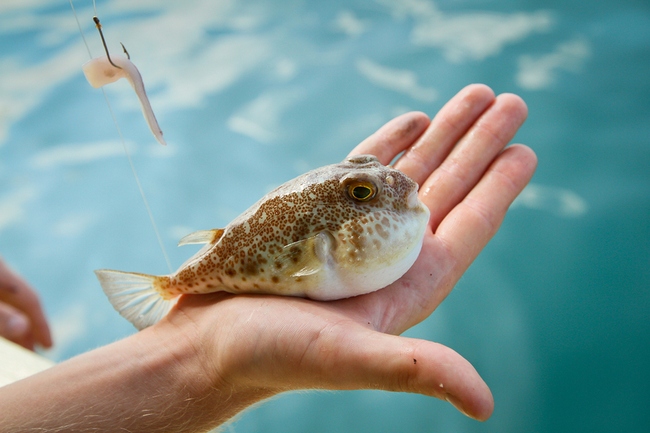- Make It Yourself Lavender Heart-Shaped Bath Bombs!
- 20 Things You Never Knew About “Down There”
- 12 Best Foods For Those Suffering From Arthritis Pain
- 12 Personal Hygiene Mistakes Almost Everyone Makes (Mom Never Told You About #4!)
- 15 Medicinal Plants And Herbs From The Cherokee People
- 12 Mind-Blowing Benefits Of Drinking Coconut Water During Pregnancy
- 12 Outstanding Winter Foods That Won’t Fatten You Up Like A Christmas Turkey
Is Bacon Healthier Than Fish!?

Photo credit: bigstock.com
Yes, you read that right! Fish has always been touted as one of the healthiest food options, a safer and more nutritious alternative to land-based animal proteins like beef, or poultry. But new studies have shown that widely available fish, like tilapia or salmon, may actually be worse for your health than bacon! Epic meal time fans rejoice!
Fish has long been considered an essential part of a balanced diet due to its low calorie content, richness in protein, antioxidants, and omega-3 fatty acids. But a study by the Wake Forest University School of Medicine showed that the tilapia tested contained more inflammatory properties than bacon or beef.
1. How is this Possible?
Research indicates that the problem originates with how the fish are raised. Two of the most commonly sold fish are tilapia and salmon. These species of fish are frequently farm-raised, which produces large quantities of fish at low prices, contributing to their popularity with consumers. But farm-raising methods have led to potential health concerns.
Much like factory farming methods in the beef industry for example, the goal of adopting this method is to produce as much of the final product as possible and make a profit. Farm fisheries experiment with different ways to produce as much fish as they can, including different diets. Tilapia in particular is an especially hearty breed of fish, and for this reason some fish farms can get away with feeding them poor quality, or even contaminated food.
Fish raised in farms are often living in overcrowded and unsanitary conditions. To keep the fish from getting sick, they load the feed with antibiotics, which can remain in the fish’s body and end up in your food. They are also treated with pesticides to eliminate sea lice and parasites, which can also contribute to health problems.
There is also the issue of where the farms are physically located. Almost 70% of tilapia sold in the United States are of the farm-raised variety imported from China. Many fish farms are located near industrial centers and become contaminated from chemicals in the nearby environment.
Salmon is the other highly popular breed of fish, and unfortunately does not fare much better. Farm-raised salmon have been shown to contain higher levels of toxic chemicals and mercury. There’s also the appearance of the fish. Salmon is famed for it’s rich pink color, but salmon raised in captivity lose their natural color, so some farms add dyes to the salmon feed to color their flesh artificially.
Continue to Page 2

Photo credit: bigstock
2. Wild Caught vs Farm-Raised Fish: The Facts
- Farm raised salmon has been shown to contain dioxin levels 11 times higher than wild-caught salmon. Dioxin is a toxic chemical which has been linked to cancer.
- Farm-raised fish are treated with antibiotics and pesticides, traces of which can and do end up in the food we eat.
- Wild caught tilapia contain much higher levels of omega-3 fatty acids, and the omega-3’s found in the farm-raised variety are less bioavailable (usable by the body).
- Farm-raised tilapia can contribute to inflammation and has less protein than wild tilapia.
3. How to Reduce the Risks of Farm-Raised Fish
The simplest way to reduce your risk of health problems from farm-raised fish is to simply not eat it. Of course, this is easier said than done, considering around 50% of seafood sold in the United States is raised in captivity. Some fish farms have adopted healthier fish raising practices, so the quality of farm-raised fish may improve in the future. In the meantime, there are practical steps you can take to reduce your risk.
- Shop around. Buy wild-caught fish whenever you can. It may cost a bit more but the increased nutrition and reduced risk of contaminants is worth the price. If you’re in a restaurant, ask the chef or waiter whether the fish was captive or wild.
- With salmon, check which ocean it comes from. Pacific or Alaskan salmon is usually caught by fisherman in the wild. If the label says “Atlantic Salmon”, it’s usually farm-raised.
- Certain brands are healthier than others, and certain stores have higher standards than others. Whole Foods for example, has implemented stricter safety standards for how the farm-raised fish they sell are fed and cared for. Avoid buying fish imported from China when possible.
- The most commonly farm-raised foods are salmon, catfish, tilapia, “sea” bass, and codfish. If you’re buying one of these 5 types of fish, confirm whether it’s wild or captive and if it’s the latter, also check whether it comes from a reputable farm.
- Consider supplementing with a high-quality fish oil if you don’t have access to good fish on a regular basis.
READ ALSO: Top 15 Contaminated Fish You Shouldn’t be Eating
Do your research, and you can enjoy the amazing health benefits of a diet rich in fish without exposing yourself to needless risk.
References:


































Kangiska Garcia
Jun 26, 2016 at 3:08 pm
What a bunch of crap! How about some REAL scientific evidence, rather than just quoting other unscientific sites like that moron over at Natural News?? Yes, let’s eat bacon and hot dogs, after the WHO cited studies showing that those two are top colon cancer agents! Apparently, you guys don’t science much, do you?